高考英语构词法
高考英语冲刺复习考点通关大全:专题01 构词法
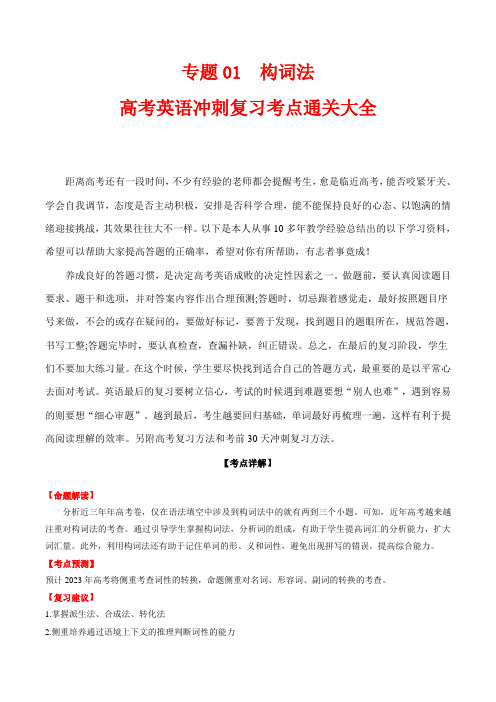
专题01 构词法高考英语冲刺复习考点通关大全距离高考还有一段时间,不少有经验的老师都会提醒考生,愈是临近高考,能否咬紧牙关、学会自我调节,态度是否主动积极,安排是否科学合理,能不能保持良好的心态、以饱满的情绪迎接挑战,其效果往往大不一样。
以下是本人从事10多年教学经验总结出的以下学习资料,希望可以帮助大家提高答题的正确率,希望对你有所帮助,有志者事竟成!养成良好的答题习惯,是决定高考英语成败的决定性因素之一。
做题前,要认真阅读题目要求、题干和选项,并对答案内容作出合理预测;答题时,切忌跟着感觉走,最好按照题目序号来做,不会的或存在疑问的,要做好标记,要善于发现,找到题目的题眼所在,规范答题,书写工整;答题完毕时,要认真检查,查漏补缺,纠正错误。
总之,在最后的复习阶段,学生们不要加大练习量。
在这个时候,学生要尽快找到适合自己的答题方式,最重要的是以平常心去面对考试。
英语最后的复习要树立信心,考试的时候遇到难题要想“别人也难”,遇到容易的则要想“细心审题”。
越到最后,考生越要回归基础,单词最好再梳理一遍,这样有利于提高阅读理解的效率。
另附高考复习方法和考前30天冲刺复习方法。
【考点详解】【命题解读】分析近三年年高考卷,仅在语法填空中涉及到构词法中的就有两到三个小题。
可知,近年高考越来越注重对构词法的考查。
通过引导学生掌握构词法,分析词的组成,有助于学生提高词汇的分析能力,扩大词汇量。
此外,利用构词法还有助于记住单词的形、义和词性,避免出现拼写的错误,提高综合能力。
【考点预测】预计2023年高考将侧重考查词性的转换,命题侧重对名词、形容词、副词的转换的考查。
【复习建议】1.掌握派生法、合成法、转化法2.侧重培养通过语境上下文的推理判断词性的能力3.注重词汇积累考点一(派生法)派生法就是由一个词根加上前缀或后缀构成另一个词。
词根是派生词的基础,而词缀起到决定派生词的词汇意义和语法属性的作用。
(一)形容词的后缀和前缀1. 名词+-cial--形容词benefit--beneficial 有益的office--official 官方的face--facial 面部的race--racial 种族的finance--financial 金融的society--social 社会的【典例剖析】(2022全国卷乙卷) l provide ___________ (finance) aid and other benefits for local peoples.【答案】financial【解析】设空处后面有名词aid,充当provide的宾语,故修饰名词应当使用形容词作定语。
2024新高考英语复习构词法
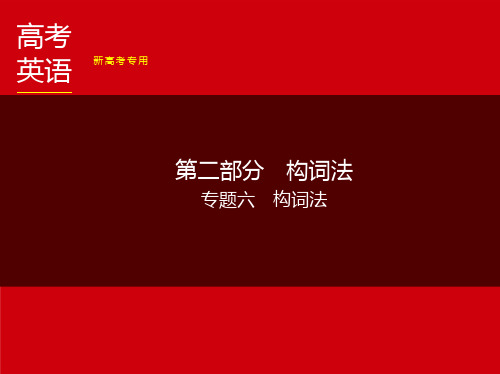
悲伤的:sorrow—sorrowful
高雅的:grace—graceful
可耻的:shame—shameful
-less
无,不
无成效的:fruit—fruitless
无意义的:meaning—meaningless
不痛的:pain—painless
坐立不安的:rest—restless
无望的:hope—hopeless
2.形容词转换为副词
后缀 -ly
意义 以……方式
例词
绝对地:absolute—absolutely
仅仅:bare—barely
真诚地:sincere—sincerely
事实上,真实地:actual—actually
最后:eventual—eventually
很少:rare—rarely
批评性地:critical—critically
具有……特 性的;与…… 有关的
实际的:practice—practical
偶然的:accident—accidental
符合逻辑的:logic—logical
职业的:profession—professional
面部的:face—facial
金融的:finance—financial
有益的:benefit—beneficial
系统的:system—systematic 有同情心的:sympathy—sympathetic
戏剧性的:drama—dramatic
悲观的:pessimism—pessimistic
热心的:enthusiasm—enthusiastic
乐观的:optimism—optimistic
科学的:science—scientific
高考英语语法——构词法

高考英语语法——构词法(Word-formation)一、构词法种类重点用法①转化用法:转化构词法是指一个单词由一种词性转化为另一种或几种词性。
也就是说,一个单词可作名词,也可作动词或别的词类,从意思上讲,是一词多义;从语法上讲,是一个词可有多种语法功能。
dream v.遇见;n.梦I dreamed a terrible dream.我做了一个噩梦。
动词名词home n.家;故乡;adv.在(向,到)家At four o’clock I went home.Then I went to Uncle Wang’s home.副词名词我4点回到家,然后去了王叔叔家。
重点用法②合成用法:合成构词法是指由两个或更多的词合成一个词,有的用连字符“-”连接,有的直接连写在一起,还有的由分开的两个词构成。
合成词中有合成名词、合成形容词、合成动词、合成代词、合成副词等,其中合成名词和合成形容词较多。
class+room=classroom教室名词+名词black+board=blackboard黑板形容词+名词good+looking=good-looking相貌好看的形容词+分词over+come=overcome克服副词+动词提示:多数合成名词变成复数时,只把主体名词变成复数,而由man,woman构成的合成名词变为复数时,必须把主体名词和man或woman都变为复数。
daughter(s)-in-law儿媳passer(s)-by路人wom e n teacher s女教师m e n doctor s男医生注意:当数词和表示年龄、质量、尺寸等的名词用连字符“-”构成合成词时,这些名词用单数形式。
He is a five-year-old boy.=He is five years old.他是一个5岁的小男孩。
It’s a four-foot-long box.这个盒子有4英尺长。
重点用法③派生用法:1.派生构词法是指由一个词根加上前缀或后缀构成另一个词。
考点08 构词法-备战2021年高考英语考点一遍过
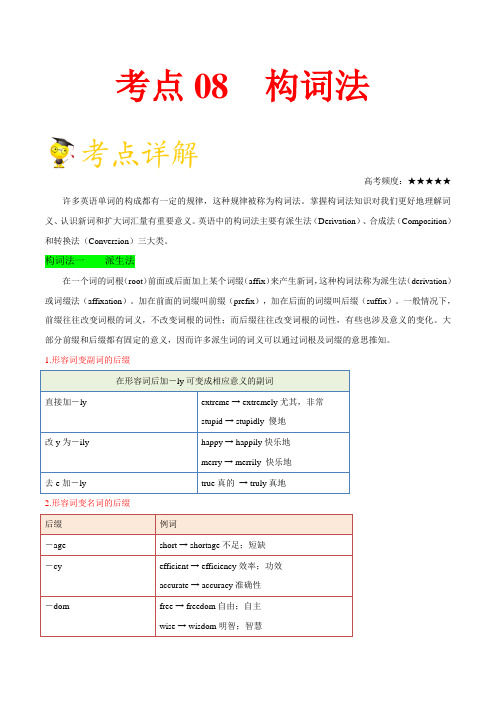
考点08 构词法高考频度:★★★★★许多英语单词的构成都有一定的规律,这种规律被称为构词法。
掌握构词法知识对我们更好地理解词义、认识新词和扩大词汇量有重要意义。
英语中的构词法主要有派生法(Derivation)、合成法(Composition)和转换法(Conversion)三大类。
构词法一派生法在一个词的词根(root)前面或后面加上某个词缀(affix)来产生新词,这种构词法称为派生法(derivation)或词缀法(affixation)。
加在前面的词缀叫前缀(prefix),加在后面的词缀叫后缀(suffix)。
一般情况下,前缀往往改变词根的词义,不改变词根的词性;而后缀往往改变词根的词性,有些也涉及意义的变化。
大部分前缀和后缀都有固定的意义,因而许多派生词的词义可以通过词根及词缀的意思推知。
1.形容词变副词的后缀在形容词后加-ly可变成相应意义的副词直接加-ly extreme → extremely尤其,非常stupid → stupidly 傻地改y为-ily happy → happily快乐地merry → merrily 快乐地去e加-ly true真的→ truly真地2.形容词变名词的后缀后缀例词-age short → shortage不足;短缺-cy efficient → efficiency效率;功效accurate → accuracy准确性-dom free → freedom自由;自主wise → wisdom明智;智慧3.动词变名词的后缀4.表示"人"的后缀在某些形容词、名词或动词后面加后缀变成具有某种职业或动作的人。
常见的表示"人"的后缀有:5.动词、名词变形容词的常见后缀6.表示否定或相反意义的前缀和后缀7.变动词的前缀和后缀hard → harden使变硬class → classify把……分类-ifybeauty → beautify美化apology → apologize道歉-izeemphasis → emphasize强调1. (2019年新课标卷I·语法填空) Scientists have responded by noting (note) that hungry bears may be congregating(聚集) around human settlements, leading to the illusion(错觉) that populations are ___68___ (high) than they actually are.【答案】higher【解析】根据其后than they actually are可知,此处为形容词的比较级,故填higher。
构词法专题 重要考点及解题技巧

语法专项2——构词法掌握一定的构词法知识,有助于系统扩大词汇量,降低阅读中的生词量,使阅读更流畅。
构词法也是高考语法填空题及改错题的重要考点。
一、三种主要构词法英语主要有三种构词法,即转化法、合成法和派生法。
1. 转化法就是把一个词从一种词类转化为另一种词类。
如:You can water the flowers with dirty water. 你可以用脏水浇花。
2. 合成法就是把两个或两个以上的词结合成一个新词。
如:Few people realized that dustmen were doing an important job.清洁工人3. 派生法就是将一个单词附加前缀或后缀,变为一个新单词。
前缀附加在单词前面,一般不改变原词的词类,但会引起词义的变化。
后缀附加在单词后面,一般不改变原词的基本含义,但会引起词类的变化。
如:We think it impossible to finish the work on time.My grandpa looks very healthy.二、近三年全国III卷高考语法填空及改错构词法考点呈现。
1.语法填空。
(1)(2018) I’m a 66 ______(science) who studied animals such as apes and monkey.(2)(2017) She is determined to carry on with her 66______________________(educate).It is 70___________(certain) fun but the lifestyle is a little unreal.(3)(2016) Food in small pieces could be eaten easily with twigs which 66____________(gradual)turned into chopsticks.Confucius, 67 who lived from roughly 551 to 479 B.C., influence the 68________(develop) of chopsticks.2.改错。
专题 17 高考英语语法【构词法】核心考点聚焦 -高考英语必背手册
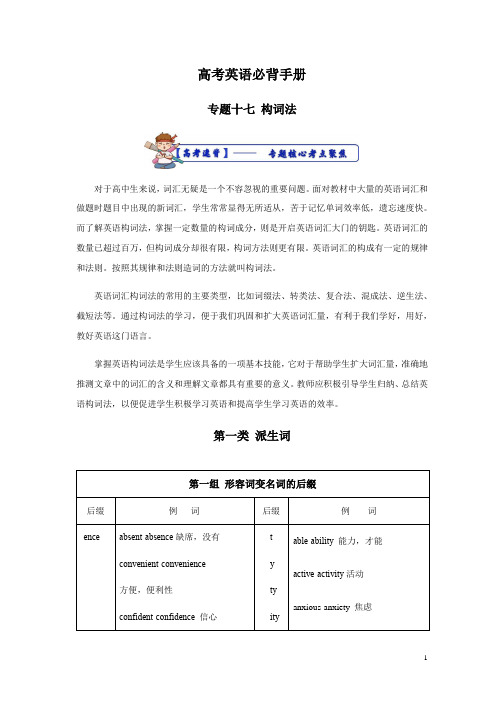
高考英语必背手册
专题十七构词法
对于高中生来说,词汇无疑是一个不容忽视的重要问题。
面对教材中大量的英语词汇和做题时题目中出现的新词汇,学生常常显得无所适从,苦于记忆单词效率低,遗忘速度快。
而了解英语构词法,掌握一定数量的构词成分,则是开启英语词汇大门的钥匙。
英语词汇的数量已超过百万,但构词成分却很有限,构词方法则更有限。
英语词汇的构成有一定的规律和法则。
按照其规律和法则造词的方法就叫构词法。
英语词汇构词法的常用的主要类型,比如词缀法、转类法、复合法、混成法、逆生法、截短法等。
通过构词法的学习,便于我们巩固和扩大英语词汇量,有利于我们学好,用好,教好英语这门语言。
掌握英语构词法是学生应该具备的一项基本技能,它对于帮助学生扩大词汇量,准确地推测文章中的词汇的含义和理解文章都具有重要的意义。
教师应积极引导学生归纳、总结英语构词法,以便促进学生积极学习英语和提高学生学习英语的效率。
第一类派生词
第三类合成法。
2023届高考英语复习之语法透析:词性转换(构词法)课件
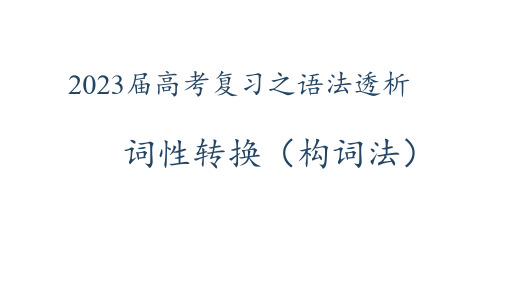
act → active 积极的;活跃的 ive effect → effective 有效的;生效的
attract → attractive 有吸引力的 impress → impressive 给人印象深刻的
02 考点精析
名词、动词转化 为形容词后缀ous
direct → indirect 间接的
02 考点精析 ir-
前缀 mis-
un
regular → irregular 不规则的 responsible → irresponsible 不负责任的
lead → mislead 误导 understand → misunderstand误解 usual → unusual 不寻常的 willing → unwilling 不愿意的 happy → unhappy 不高兴的 known → unknown 不出名的
02 考点精析
动词转化为名词 后缀ance/ence
appear → appearance 出现;外貌 perform → performance 表演;节目 exist → existence 存在;生存 prefer → preference 偏爱 refer → reference 参考;查阅 guide → guidance 指引;指导
doubt → doubtful 怀疑的 forget → forgetful 健忘的 harm → harmful 有害的 hope → hopeful 有希望的 peace → peaceful 和平的
02 考点精析
名词、动词转化 为形容词后缀
scare → scared 感到恐惧的 -ed confuse → confused 感到困惑的
高考英语语法必考考点(15)构词法(含解析)
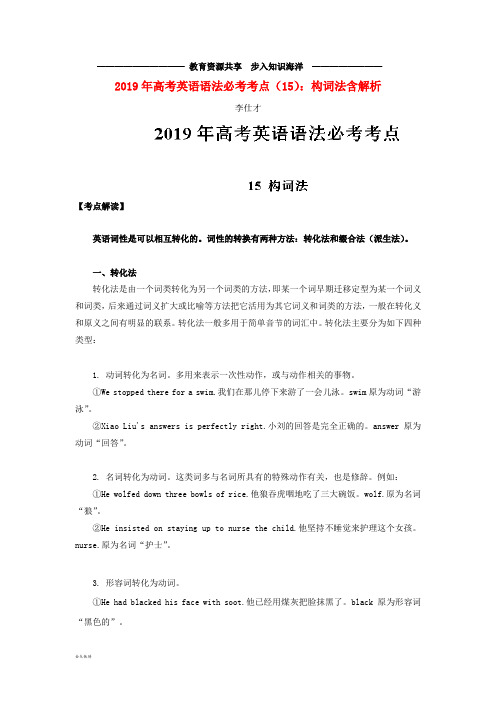
——————————教育资源共享步入知识海洋————————2019年高考英语语法必考考点(15):构词法含解析李仕才【考点解读】英语词性是可以相互转化的。
词性的转换有两种方法:转化法和缀合法(派生法)。
一、转化法转化法是由一个词类转化为另一个词类的方法,即某一个词早期迁移定型为某一个词义和词类,后来通过词义扩大或比喻等方法把它活用为其它词义和词类的方法,一般在转化义和原义之间有明显的联系。
转化法一般多用于简单音节的词汇中。
转化法主要分为如下四种类型:1. 动词转化为名词。
多用来表示一次性动作,或与动作相关的事物。
①We stopped there for a swim.我们在那儿停下来游了一会儿泳。
swim原为动词“游泳”。
②Xiao Liu's answers is perfectly right.小刘的回答是完全正确的。
answer原为动词“回答”。
2. 名词转化为动词。
这类词多与名词所具有的特殊动作有关,也是修辞。
例如:①He wolfed down three bowls of rice.他狼吞虎咽地吃了三大碗饭。
wolf.原为名词“狼”。
②He insisted on staying up to nurse the child.他坚持不睡觉来护理这个女孩。
nurse.原为名词“护士”。
3. 形容词转化为动词。
①He had blacked his face with soot.他已经用煤灰把脸抹黑了。
black 原为形容词“黑色的”。
②My father is emptying a box of rubbish into a rubbish-cart.我爸爸正将垃圾倒入垃圾车。
empty原为形容词“空的”。
4. 形容词转化为名词。
即用性质来指代这种性质的事物。
例如:①My mother likes red.我妈妈喜欢红色(的)。
red原为形容词“红色的”。
②The Chinese are working-hard and brave people.中国人勤劳而勇敢。
高考英语三大构词法之详解汇总
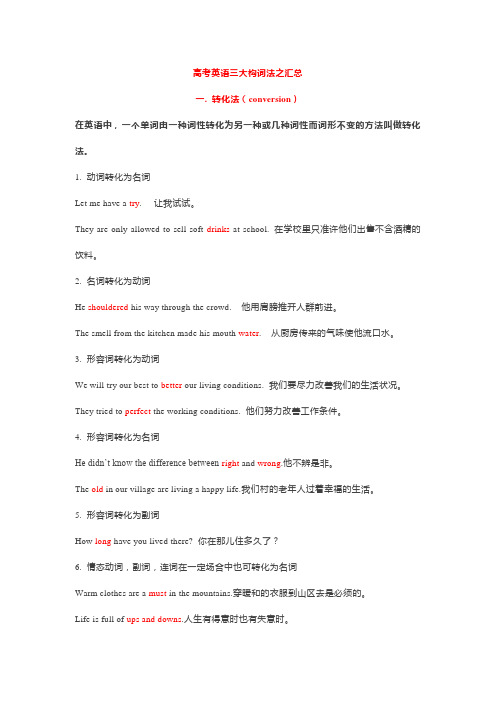
高考英语三大构词法之汇总一. 转化法(conversion)在英语中,一个单词由一种词性转化为另一种或几种词性而词形不变的方法叫做转化法。
1. 动词转化为名词Let me have a try. 让我试试。
They are only allowed to sell soft drinks at school. 在学校里只准许他们出售不含酒精的饮料。
2. 名词转化为动词He shouldered his way through the crowd. 他用肩膀推开人群前进。
The smell from the kitchen made his mouth water. 从厨房传来的气味使他流口水。
3. 形容词转化为动词We will try our best to better our living conditions. 我们要尽力改善我们的生活状况。
They tried to perfect the working conditions. 他们努力改善工作条件。
4. 形容词转化为名词He didn’t know the difference between right and wrong.他不辨是非。
The old in our village are living a happy life.我们村的老年人过着幸福的生活。
5. 形容词转化为副词How long have you lived there? 你在那儿住多久了?6. 情态动词,副词,连词在一定场合中也可转化为名词Warm clothes are a must in the mountains.穿暖和的衣服到山区去是必须的。
Life is full of ups and downs.人生有得意时也有失意时。
His argument contains too many ifs and buts. 他的辩论中含有太多的“如果”和“但是”。
二. 合成法(composition)由两个或两个以上的单词连在一起合成一个新词,这种构词法叫做合成法,合成的词叫做合成词(compounds)。
高考英语总复习构词法(30张PPT)
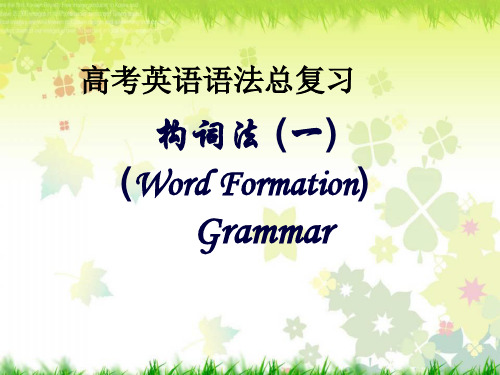
转化法(Conversion)
visit v.
visit n.
缩略法(Abbreviation)
Do it yourself.
DIY
合成词 Compound
pain-killer
+
=
color- blind
+
=
sleep-walk
+
=
sleep-walker
一、合成法(Compounding)
✓思路点拨:warmly 修饰动词smiled作状语,用 副词形式。
1. Write out the original words.
unchangeable adj. c_h_a_n__g_e_ dislike v. __l_ik_e______ impossibility n. _p_o_s_s_ib_l_e__ unfriendly adj.___fr_i_e_n_d___ overwork v. ___lo_o_k_________ misunderstanding n. u_n__d_er_s_t_a_n_d___ athletic adj._a_t_h_le_t_e________ misread v. r_e_a_d_____ translator n. __t_r_a_n_s_la_t_e____
1.Many countries import most of the oil
they use.
进口
2.He studied biophysics at college.
生物物理学
3.It is very important to learn how to
cooperate with others. 合作
telephone 电话→打电话 hand手 → 交给 record 录音→记录 date 日期→ 定日期
第07讲 构词法(讲义)-2025年高考英语一轮复习讲练测(新教材新高考)含解析
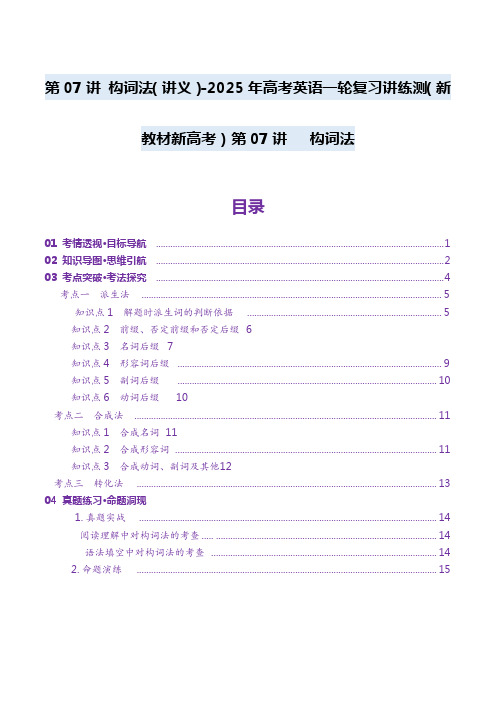
第07讲构词法(讲义)-2025年高考英语一轮复习讲练测(新教材新高考)第07讲构词法目录01 考情透视.目标导航 (1)02 知识导图.思维引航 (2)03 考点突破.考法探究 (4)考点一派生法 (5)知识点1 解题时派生词的判断依据 (5)知识点2 前缀、否定前缀和否定后缀 6知识点3 名词后缀 7知识点4 形容词后缀 (9)知识点5 副词后缀 (10)知识点6 动词后缀10考点二合成法 (11)知识点1 合成名词11知识点2 合成形容词 (11)知识点3 合成动词、副词及其他12考点三转化法 (13)04 真题练习·命题洞现1.真题实战 (14)阅读理解中对构词法的考查..... .. (14)语法填空中对构词法的考查 (14)2.命题演练 (15)复习目标:、具备根据语境推断词性及意思的能力;掌握构词法的三大规则:派生、合成和转换;掌握构词法,提高阅读速度,提高核心素养;具备根据句法知识判断句子成分并判断其词性,然后准确写出正确形式的能力;考点概述:许多英语单词的构词都有一定的规律,这种规律被成为构词法。
掌握构词法知识对考生更好的理解词义、认识新词和扩大词汇量有重要意义。
意义中的构词法主要有派生法(Derivation)、合成法(Composition)和转换法(Conversion)三大类。
【高考导航】1.(2024年浙江1月高考阅读理解D片段)We are tempted by sugary treats because our ancestors lived in a calorie-poor world, and our brains developed a response mechanism to these treats that reflected their value— a feeling of reward and satisfaction.2. (2023年新高考I卷) Xiao long bao(soup dumplings), those amazing constructions of delicate dumpling wrappers, encasing hot, ___56___(taste)soup and sweet, fresh meat, are far and away my favorite Chinese street food.考点一派生法知识点1 派生词的判断依据1.冠词、物主代词等词类后一般跟名词。
高考英语构词法知识点总结
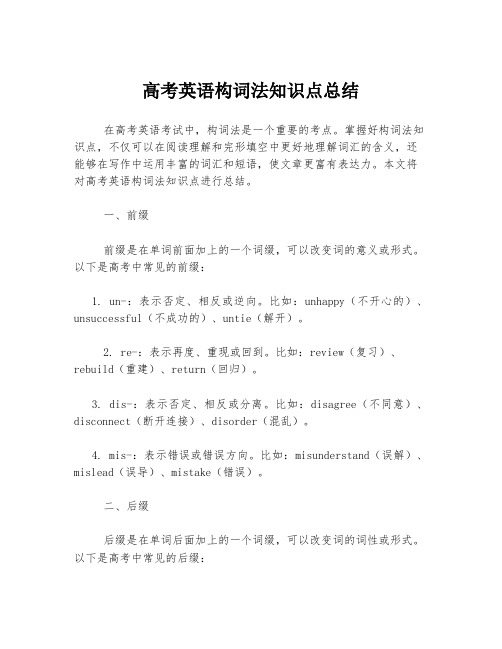
高考英语构词法知识点总结在高考英语考试中,构词法是一个重要的考点。
掌握好构词法知识点,不仅可以在阅读理解和完形填空中更好地理解词汇的含义,还能够在写作中运用丰富的词汇和短语,使文章更富有表达力。
本文将对高考英语构词法知识点进行总结。
一、前缀前缀是在单词前面加上的一个词缀,可以改变词的意义或形式。
以下是高考中常见的前缀:1. un-:表示否定、相反或逆向。
比如:unhappy(不开心的)、unsuccessful(不成功的)、untie(解开)。
2. re-:表示再度、重现或回到。
比如:review(复习)、rebuild(重建)、return(回归)。
3. dis-:表示否定、相反或分离。
比如:disagree(不同意)、disconnect(断开连接)、disorder(混乱)。
4. mis-:表示错误或错误方向。
比如:misunderstand(误解)、mislead(误导)、mistake(错误)。
二、后缀后缀是在单词后面加上的一个词缀,可以改变词的词性或形式。
以下是高考中常见的后缀:1. -er/-or:表示人或物的职业或身份。
比如:teacher(教师)、actor(演员)、visitor(访客)。
2. -ing:表示动作进行中或状态。
比如:running(跑步的)、falling(下落的)、sleeping(睡觉的)。
3. -able/-ible:表示可行的或可接受的。
比如:usable(可用的)、visible(可见的)、credible(可信的)。
4. -ful:表示充满或具有的特性。
比如:beautiful(美丽的)、wonderful(美妙的)、helpful(有帮助的)。
三、词根词根是单词中最基本的部分,可以通过添加前缀或后缀来构成新的单词。
以下是高考中常见的词根:1. log-:表示言论或思考。
比如:dialogue(对话)、logic (逻辑)、monologue(独白)。
高考英语语法填空解题技巧:构词法
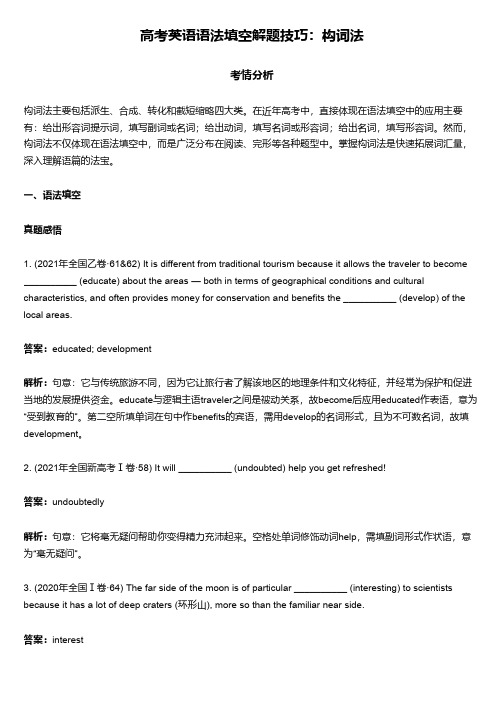
高考英语语法填空解题技巧:构词法考情分析构词法主要包括派生、合成、转化和截短缩略四大类。
在近年高考中,直接体现在语法填空中的应用主要有:给出形容词提示词,填写副词或名词;给出动词,填写名词或形容词;给出名词,填写形容词。
然而,构词法不仅体现在语法填空中,而是广泛分布在阅读、完形等各种题型中。
掌握构词法是快速拓展词汇量,深入理解语篇的法宝。
一、语法填空真题感悟1. (2021年全国乙卷·61&62) It is different from traditional tourism because it allows the traveler to become __________ (educate) about the areas — both in terms of geographical conditions and cultural characteristics, and often provides money for conservation and benefits the __________ (develop) of the local areas.答案:educated; development解析:句意:它与传统旅游不同,因为它让旅行者了解该地区的地理条件和文化特征,并经常为保护和促进当地的发展提供资金。
educate与逻辑主语traveler之间是被动关系,故become后应用educated作表语,意为“受到教育的”。
第二空所填单词在句中作benefits的宾语,需用develop的名词形式,且为不可数名词,故填development。
2. (2021年全国新高考Ⅰ卷·58) It will __________ (undoubted) help you get refreshed!答案:undoubtedly解析:句意:它将毫无疑问帮助你变得精力充沛起来。
构词法-备战2023年高考英语复习语法知识点全面梳理(全国通用)

副词+现在分词 hard-working, far-seeing, well-meaning
副词+过去分词 well-prepared, quickly-cured, well-known
3.3 合成法
复合名词的构成
方式
例词
名词+名词 形容词+名词 动名词+名词 动词+副词 动词+名词
horseback , bank-note, newspaper, cell-phone back-yard, forehead, greenhouse, blackboard hiding-place, reading-room get-off, break-in, breakdown, breakup pickpocket , break-water
词类 数词 副词
后缀 -teen -ty -th -ly
例词 thirteen 十三 fifteen 十五 twenty 二十 fifth 第五 carefully 细心地 happily 开心地
3.2 转化法
3.3 合成法
复合形容词的构成
方式
例词
形容词+名词
first-class, part-time, second-hand, bare-foot
常用后缀 词类
形容词
后缀
-able, -ible
-al -ed -en -ern
-ing
例词
comfortable舒服的 enjoyable 快乐的 flexible灵活的
traditional 传统的 national 民族的 surprised 感到吃惊的 wooden 木制的 golden 金的 eastern 东方的 western 西方的
2022年高考英语复习一轮:专题十二构词法 —课标导航、考点清单
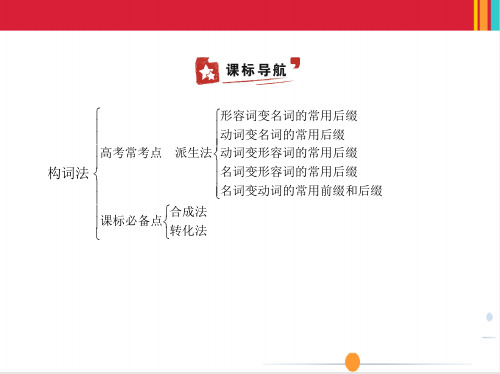
3.其他形式的合成词
合成动词 合成代词 合成副词 合成介词
类别
典例 safeguard保卫,underline强调,sleepwalk梦游 everybody每人,everything每件事,anyone任何人 sometimes有时,outdoors在户外,meanwhile同时 throughout遍及,inside在里面,within在……之内
一、形容词变名词的常用后缀
常用后缀 -age -cy -dom -ence
例词 short→shortage不足;短缺 efficient→efficiency效率;功效 fluent→fluency流利;流畅
free→freedom自由;自主
wise→wisdom明智;智慧
different→difference 差异
four-footed四只脚的 full-time全日的 dark-blue深蓝的
three-legged 三条腿的 high-class高级的 light-green浅绿的
形容词+名词+-ed 形容词/副词+动词-ing 形容词/副词+动词-ed 名词+形容词 名词+动词-ing 名词+动词-ed
hear→hearing听力;听觉 begin→beginning开始
fail→failure失败 press→pressure压力 mix→mixture混合;混合物 depart→departure离开;出发
续表
续表
-y
recover→recovery恢复;痊愈
discover→discovery发现
其他
choose→choice选择 vary→variety多样化;种类 tend→tendency趋向;趋势
高中英语 高考真题中的构词法与巩固练习
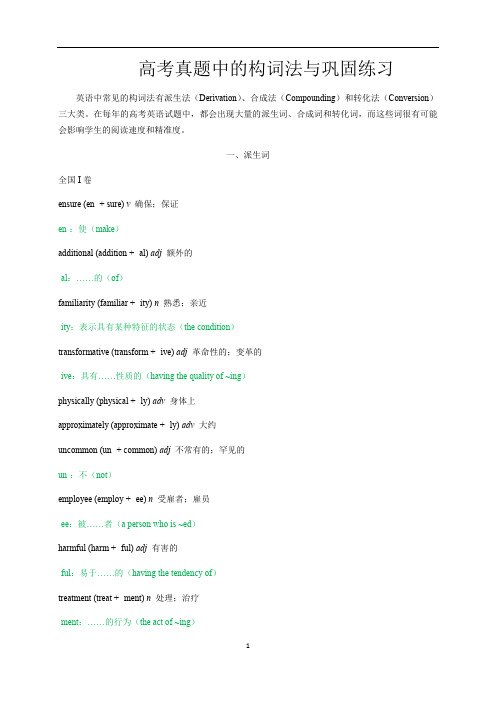
高考真题中的构词法与巩固练习英语中常见的构词法有派生法(Derivation)、合成法(Compounding)和转化法(Conversion)三大类。
在每年的高考英语试题中,都会出现大量的派生词、合成词和转化词,而这些词很有可能会影响学生的阅读速度和精准度。
一、派生词全国I卷ensure (en- + sure) v确保;保证en-:使(make)additional (addition + -al) adj额外的-al:……的(of)familiarity (familiar + -ity) n熟悉;亲近-ity:表示具有某种特征的状态(the condition)transformative (transform + -ive) adj革命性的;变革的-ive:具有……性质的(having the quality of ~ing)physically (physical + -ly) adv 身体上approximately (approximate + -ly) adv大约uncommon (un- + common) adj不常有的;罕见的un-:不(not)employee (employ + -ee) n受雇者;雇员-ee:被……者(a person who is ~ed)harmful (harm + -ful) adj有害的-ful:易于……的(having the tendency of)treatment (treat + -ment) n处理;治疗-ment:……的行为(the act of ~ing)empower (em- + power) v授权;使能够em- (=en-):使(make)apparently (apparent + -ly) adv显然地merely (mere + -ly) adv仅仅;只不过absolutely (absolute + -ly) adv绝对地;完全地unreasonable (un- + reasonable) adj不合理的un-:不(not)repeatedly (repeated + -ly) adv重复地;再三地temporarily (temporary + -ly) adv暂时地casually (casual + -ly) adv偶然地;随意地extremely (extreme + -ly) adv极其;非常全国II卷inspirational (inspiration + -al) adj启发灵感的-al:有……性质的(having the nature of)psychologist (psychology + -ist) n心理学家-ist:从事……的专家predictor (predict + -or) n有预测作用的事物-or:……物(a thing that ~s)developmental (development + -al) adj发展的-al:……的(of)environmentalist (environmental + -ist) n环保主义者-ist:……主义者ecologist (ecology + -ist) n生态学家ecosystem (eco- + system) n生态系统eco-:生态(abstracted from “ecology”)biologist (biology + -ist) n生物学家risky (risk + -y) adj冒险的-y:有……特征的(characterized by)wonderment (wonder + -ment) n 惊奇;惊喜-ment:the state of ~ing(……的状况)excitement (excite + -ment) n 激动;兴奋-ment:the state of ~ing(……的状况)novelist (novel + -ist) n 小说家announcement (announce + -ment) n 宣布;宣告-ment:the act of ~ing(……的行为)uneasy (un- + easy) adj 不自在的;忧虑的-un:不(not)soften (soft + -en) v使变温和-en:使(cause to be)enable (en- + able) v使能够en-:使(make)conversational (conversation + -al) adj交谈的;谈话的-al:……的(of)certainly (certain + -ly) adv必然;肯定地renewal (renew + -al) n恢复;更新-al:……行为(the act of ~ing)surely (sure + -ly) adv一定;必定;想必全国III卷tasty (taste + -y) adj 美味的-y:有……特征的(characterized by)enrich (en- + rich) v丰富en-:使(make)treasury (treasure + -y) n宝库exceptional (exception + -al) adj非凡的multigenerational (multi- + generation + -al) adj多代的multi-:多的(many)traditionally (traditional + -ly) adv历来coastal (coast + -al) adj近海的;沿海的characteristic (character + -istic) n特征;特色;特点registry (register + -y) n登记处unpack (un- + pack) v打开(盒子、包或手提箱等)取出(物品)un-:取走(to remove)speechless (speech + -less) adj 说不出话的-less:无(without)milky (milk + -y) adj 奶制的;像奶的-y:多……的(full of)gently (gentle + -ly) adj 温柔地;温和地effectiveness (effective + -ness) n有效性-ness:……的性质或状态(the quality or condition of being)guidance (guide + -ance) n指导;引导-ance:……的行为(the act of ~ing)popularity (popular + -ity) n受欢迎;普及;流行-ity:……的状态(the condition of)浙江卷meaningful (meaning + -ful) adj有意义的-ful:充满……的(full of)widen (wide + -en) v(使)变宽-en:使(cause to be)analytical (analytic + -al) adj分析的managerial (manager + -ial) adj管理的multitasking (multi- + task + -ing) n同时做几件事情multi-:多的(many)environmental (environment + -al) adj环境的;环保的loneliness (lonely + -ness) n孤独-ness:……的性质或状态(the quality or condition of being)helpful (help + -ful) adj有帮助的;有益的-ful:充满……的(full of)colorful (color + -ful) adj颜色鲜艳的;五彩缤纷的-ful:充满……的(full of)machinery (machine + -ery) n机器;机械-ery:……的群体或集体(a group of ~s)山东卷disqualification (dis- + qualify + -tion) n取消资格dis-:取消(undo)warmth (warm + -th) n温暖;热情-th:……的性质或状态(the quality or condition of being)architectural (architecture + -al) adj建筑学的;建筑方面的sadden (sad + -en) v使悲哀;使悲痛-en:使(cause to be)reportage (report + -age) n事件报道-age:……行为(the act or of ~ing)eventful (event + -ful) adj多事故的;经历丰富的-ful:充满……的(full of)viewership (viewer + -ship) n(电视节目或频道的)观众人数;观众类型-ship:……的数量(the number of ~s)significantly (significant + -ly) adv显著地;明显地extremely (extreme + -ly) adv非常;极其overweight (over- + weight) adj超重的over-:过多(too much)earthen (earth + -en) adj陶制的-en:由……制成的(be made of)二、合成词全国I卷timetable (time + table) n时刻表wheelchair (wheel + chair) n轮椅workplace (work + place) n工作场所houseplant (house + plant) n室内盆栽植物groundwater (ground + water) n地下水lifetime (life + time) n 一生;终生daylight (day + light) n日光highway (high + way) 公路;大道onboard (on + board) adj在船(或飞机、车)上的全国II卷award-winning (award + winning) adj获奖的parkland (park + land) n(如乡村大宅院周围的)有草木的开阔地fine art (fine + art) n 美术(尤指绘画和雕塑)math-related (math + related) adj与数学相关的high-income (high + income) adj高收入的self-control (self + control) n 自制力showcase (show + case) v展示guilt-free (guilt + free) adj没有负罪感的wetland (wet + land) n湿地;沼泽outcome (out + come) n结果全国III卷footstep (foot + step) n脚步声;足迹waterway (water + way) n水路;航道in-depth (in + depth) adj彻底的;渗入详尽的underground (under + ground) adj地下的fur-coat-wearing (fur + coat + wearing) adj穿毛皮大衣的full-body (full + body) adj 全身的filmmaker (film + maker) n电影制作人realistic-looking (realistic + looking) adj逼真的off-set (off + set) adj在拍摄场外的doorway (door + way) n门口;门道mother-in-law (mother + in + law) n岳母;婆婆standpoint (stand + point) n观点;立场household (house + hold) n一家人;家庭carefree (care + free) adj 无忧无虑的;无牵挂的;无责任的highland (high + land) n高地;高原houseboat (house + boat) n船屋shellfish (shell + fish) n(尤指可以吃的)水生有壳动物underwater (under + water) adv 在水下;在水中housewarming (house + warming) n乔迁聚会firewood (fire + wood) n柴火;木柴businesswoman (business + woman) n女商人;女企业家handbag (hand + bag) n手提包shopkeeper (shop + keeper) n店主salesperson (sale + person) n售货员lifelike (life + like) adj 逼真的;生动的;栩栩如生的masterpiece (master + piece) n杰作;名著;代表作waterfall (water + fall) n瀑布浙江卷playgoer (play + goer) n经常去戏院看戏的人;爱看戏的人play-reader (play + reader) n(为出版商、演出人或剧团等阅读并评价剧本的)剧本读评人houselight (house + light) n 剧院灯光cure-all (cure + all) n 万灵药;灵丹妙药overall (over + all) adj全面的teamwork (team + work) n 协作;配合decision-making (decision + making) n决策high-level (high + level) adj高级的babysit (baby + sit) v代人临时照看小孩cardboard (card + board) n硬纸板leftover (left + over) adj剩余的lifelong (life + long) adj终身的;毕生的motorway (motor + way) n高速公路山东卷round-trip (round + trip) adj 来回旅程的willpower (will + power) n 意志力first-generation (first + generation) adj第一代的well-rounded (well + rounded) adj全面的intake(in + take) n(食物等的)摄取量undergraduate (under + graduate) n本科生daytime(day + time) n白天rainwater (rain + water) n雨水naturally-grown(naturally + grown) adj 自然生长的postcard (post + card) n 明信片三、转化词全国I卷However, race walking does not pound the body as much as running does.pound v [名词动词化] 连续重击We’re thinking about how we can engineer plants to replace functions of the things that we use every day.engineer v [名词动词化] 改变(动植物等的)基因结构The technology, Strano said, could one day be used to light the rooms.light v [名词动词化] 照亮全国II卷It was a special time to bond with my children.bond v [名词动词化](与某人)培养一种特殊的关系Frequent them and talk about them when you can.frequent v [形容词动词化] 常去;常到The plum trees are the first to flower even as the snow is melting.flower v [名词动词化] 开花全国III卷Discover the China of “past ages,” its walled cities, temples and mountain scenery with Prof. Robert Thorp.wall v [名词动词化] 用墙把……围住The creative team ... and later processes it with computer graphics to create a final image(图像).process v [名词动词化] 处理And there are questions about the films ... are not monitored as closely as productions filmed in the States.film v [名词动词化](把……)拍成电影The Bajau, as these people are known, number in the hundreds of thousands in Indonesia, Malaysia and the Philippines.number v [名词动词化] 总计They made a living as divers, spearfishing or harvesting shellfish.harvest v [名词动词化] 捕猎(动物、鱼等)浙江卷To get the most out of reading these plays, try to picture the play on stage.picture v [名词动词化] 想象;设想Challenging work that requires ... might help your brain stay sharp as you age.age v [名词动词化] 变老My brother, of course, raced off to be with his friends, while I had plenty to do myself.race v [名词动词化] 快速移动They’re all memories I treasure today.treasure v [名词动词化] 珍惜;珍视I’ve been farming sheep on a hillside for 54 years.farm v [名词动词化] 饲养山东卷Watering young plants in the dry season was tough for a lone boy.water v [名词动词化] 给(植物)浇水如果你还不满足于只学不练,别着急,小编为你量身打造了检测小卷,希望你能小试身手,一气呵成。
高三英语构词法(共59张PPT)

派生法引起的语法变化
动词也可通过前缀构成
enable
enlarge
endanger
注意: 派生法的规则不代表每个单词都可以用相同的前缀或者后缀进行语义 功能及语法功能的改变
派生法在语篇中的运用
1. Every college discussion about community values, social climate and behavior should include recognition of the developmental importance of student autonomy and self-regulation, of the necessary tension between safety and self-discovery.
Some people believe that the Internet has many negative aspects. Talking to people online or having a friendship with someone you only talk to on the Internet isn’t a replacement for real-life communication. While it can connect you with other people who use a smartphone, face-to-face contact with others is important to help you maintain healthy relationships.
合成法实践
1. While e-shops can use sights and sounds, only bricks-and-mortar stores can offer a full experience from the minute customers step through the door to the moment they leave. (14北京高考,D)
高考英语必背构词法与词性转化

活用构词法,秒杀词性转换牢记几种常考的构词法1动词变名词的后缀4.动词、名词变形容词的后缀常见的动词、名词变形容词的后缀有一able,—al,—ful,—ed,—ing,—ible,—ive, —-ible access n .进入,使用权,通路—accessible adj.容易取得的-ous caution n •谨慎—cautious adj.谨慎的5.表示否定或相反意义的前缀和后缀常见的表示否定或相反意义的前缀和后缀有dis—, il—, im—, in—, ir—, mis—, un 一,一less 等。
6.变动词的前缀和后缀近年高考大类词性转换汇总01形容词一副词6年13考均为形容词变副词的一般情况1.(2019・全国II卷)final最终的—finally终于2.(2018■全国II卷、2014■全国I卷)actual真实的—actually实际上3.(2016・全国I 卷)official 正式的—officially 正式地4.(2016・全国III 卷)gradual 逐渐的—gradually 逐渐地tips关于形容词词尾1,同学们怕是有很多误会,要知道变副词时"ll"结尾加.如full—fully, dull—dully;”le”结尾e改y,高中阶段只有whole—wh011y是例外。
记住以上两点,千万别看到l就加y!5.(2019,全国I卷)huge巨大的—hugely极度;非常,深深地tips:形变副规律中”元音字母+e"去e加-ly,关于这点只要记住高中阶段的true—truly,注意“辅音字母+e”变副词,不可去掉e!6.(2019,全国I卷)poor贫穷的,贫乏的—poorly不足7.(2017,全国II卷)fair相当大的—fairly相当地8.(2017・全国III 卷)certain 确定—certainly 无疑,确定9.(2016・全国II卷、2015・全国I卷)regular有规律的—regularly有规律地10.(2015・全国II卷)slow慢的—slowly缓慢地11.(2014,全国II 卷)sudden 突然的—suddenly 突然tips :除了上述规则外,还要记住它:1.以y结尾的形容词:”辅音字母+y"改i加-ly,如:merry—merrily;如果y的读音同“爱”,直接加-ly,如:shy—shyly。
- 1、下载文档前请自行甄别文档内容的完整性,平台不提供额外的编辑、内容补充、找答案等附加服务。
- 2、"仅部分预览"的文档,不可在线预览部分如存在完整性等问题,可反馈申请退款(可完整预览的文档不适用该条件!)。
- 3、如文档侵犯您的权益,请联系客服反馈,我们会尽快为您处理(人工客服工作时间:9:00-18:30)。
高考英语构词法,英语讲授,词汇学习技巧How Words Are FormedWhen we learn English, it is very, very important to know how English words are formed. Once we know this, we can learn words easily.English people add "heads" or "tails" to words. The word without a head nor a tail is called root. Usually the head is called prefix, while the tail is called suffix.PrefixesThere are some prefixes you can add to some words to form new words. For example, mis- can be added to some verbs, meaning "wrong" or "wrongly". I can understand my English teacher well. means I often know what my English teacher says in class. But I misunderstood him. means I failed to understand him correctly.Adding prefixes is a very common way to form a new word. Most often, we have the following prefixes:in- (im-, il-, ir-): the opposite of somethingindependent: an independent person is someone who does not depend on someone else; an independent country is a country which is not controlled by other country or countries; an independent organisation is an organisation that is not controlled or run by another organisation or government.inaccessible: access is the way or possibility of coming to a place or person. Accessible means "able to be reached". Inaccessible means "very difficult or impossible to go to": Mount Qomolangma (the highest place of Himalayas) is one of the most inaccessible places. impossible: not possibleillegal: legal means "allowed by laws", so illegal means "not allowed by laws".irregular: regular means "happening every hour, every minute, etc.", so irregular means "not happening every hour, etc.".tele-: at or over a long distancetelevision: something you can see, and something that comes to you over a long distance (vision meaning "something you can see")telecommunication: the communication you can do over a long distance, like phone call, email, etc.teleconference: a meeting which is carried out over a long distance, for example by telephone, or other ways like television.telephone: phone is a Greek word meaning "sound" or "voice", so everybody knows this word telephone.inter-: between or involving two or more people, places, countries, etc.internet: the Internet is a system which allows millions of millions of computer users to exchange information. Net is something we use to catch fish, etc., and a net is usually made of threads or other similar things like wires that are woven across each other. The way the Internet works is quite similar to "net", so maybe this is the reason people use net to form this word. Another word quite similar is web: a web is something like a net.international: nation is similar to country, and national is an adjective, so international means "relating to two or more countries".intercom: com is from communication, so intercom is a system people use in a building or in an office building to talk to each other.There are many other common prefixes in English language. Please go to a dictionary to learn some.SuffixesSuffixes are something you add to the end of a word. Suffixes are even more common than prefixes. For example, a teacher is someone who teaches; a worker is someone who works, etc., so -er means "someone who does something". A lecturer is someone who gives lectures.-able (-ible): that you can dowashable: something washable means something you can wash in water.drinkable: something drinkable, like water, means something you can drink.accessible: something accessible means something you can reach.-ly: in a particular way (when added to an adjective); like something or every (when added to a noun)happily: in a happy wayfriendly: like a friend; motherly: like a mother (but not a mother); kingly: like a king (but not a king)weekly: every week; monthly: every month-less: withoutcareless: without careaimless: without aimschildless: without children-ful: full ofcareful: full of carehopeful: full of hopethankful: full of thanksFor many other suffixes, you can follow your teacher or go to a dictionary for information. CompoundsIt is easy to understand a compound: when two or more independent words come together, we say it is a compound word. Blackboard is from black and board; website is from web and site; hardware is from hard and ware, which means "things".Other waysBesides the above three ways, there are ways like:Many homeless people are being housed in temporary accommodation. (to house is from a house) Do you Yahoo today? means "Do you visit Yahoo website today?" or "Do you use Yahoo today?". modem, which is from modulator and demodulatorbrunch, which is from breakfast and lunchsmog, which is from smoke and fogmotel, which is from motor and hotellab, which is from laboratorytaxi (or cab), which is from taxicabA cry-out-at-the-sight-of-a-mouse girl is a girl who cries out at the sight of a mouse.A five-year-old boy is a boy who is five years old.A filmgoer is someone who goes to a film, so is the moviegoer or cinemagoer.ConclusionSo, it is not a bad idea to enrich your vocabulary by learning the way a word is formed. Important notesTraditionally, we treat text message as two words, but in meaning they cannot be separated, and the sound is /"tekst 'mesIdP/, with one stress at the head. The same is true with the following words:mobile phonemovie starafternoon teabread and butterThey are much the same as the Chinese bo(1)li(0): two characters but one meaning.Words and Their PartsLearning the parts of a word is very important. It is a very good way to enrich your vocabulary. Some people think it is easy to learn these parts, but actually it is difficult. For example, how to learn these words: part / depart / department / departure? Are they related to each other? If so what about the meaning of these words? They are so different!So it is very important to know how a word and its parts.At the same time, you can use Resources / Word List from the menu. You can easily see the heads of a group of words, or the tails of a group of words. (See also in this CD-ROM: How Words Are Formed.)We hope you can learn these parts of a English word, and of course, try to use them.abandonedfrom: to abandonacademicfrom: academy; pattern: n. + -ic = adj.accessiblefrom: to access; pattern: v. + -ible (-able) = adj.aimThe word acts as a noun and as a verb.amazedfrom: to amazeIn English, there are a large group of verbs, like to amaze, to amuse ,etc. But we do not usually use them as a verb. After we add -ing, or -ed, we regard and use them as adjectives. Other examples: interesting / exciting / depressing, etc. and their -ed forms.amazingfrom: to amazeamusingfrom: to amusearchitecturefrom: architect(n.) (An architect (n.) is someone who designs buildings.)assistantfrom: to assist; pattern: v. + -ant = n.astonishedfrom: to astonishattractivefrom: to attract; pattern: v. + -ive = adj.boredfrom: to borebreakdownfrom: to break downbrilliantrelated form: brilliance (n.)cassettefrom: case; pattern: n. + -ette (small) = n.Think about the meaning of these words: cigarette / kitchenette / barrette (bar + -ette) / diskette / novelette / luncheonette. Do you know there is a character called Manette in Charles Dickens' story A Tale of Two Cities? Why did Dickens give the person such a name?completelyfrom: complete; pattern: adj. + -ly = adv.comprehensionfrom: to comprehend; pattern: v. + -sion = n.conclusionfrom: to conclude; pattern: v. + -sion = n.correctionfrom: to correct; pattern: v. + -tion = n.crucibleWe have just a few -ible ending words as nouns: collectible (something you collect); convertible (a kind of car); submersible (a kind of ship running under water).datafrom: datum (n.) (singular form, a form we hardly use.)departmentThe word is from the French language. In English, to depart means to leave.descriptionfrom: to describe; pattern: v. + -tion = n.disadvantageIt is very hard to explain the formation of this word. -age is usually added to a verb, so we have advance →advantage. Dis- is usually used before a verb, like disagree, or an adjective, like disable. But what is about disadvantage? We don't have such a word like disadvance (?). disappearfrom: to appear; pattern: dis- + v. = v.disappointedfrom: to disappoint; pattern: v. + -ed = adj. (disappoint: dis- + v.; pattern: dis- + v. = v.) disappointingfrom: to disappoint; pattern: v. + -ing = adj. (disappoint: dis- + v.; pattern: dis- + v. = v.)dissolvefrom: to solve; pattern: dis- + v. = v.distancerelated form: distant (adj.)downtownfrom: down + town. Down has a meaning in the south, and up has a meaning in the north. But here, downtown means towards the business area of a town or city, while uptown means towards the residential area of a town or city.electricalrelated forms: electric (adj.), electricity (n.)electricityfrom: electric; pattern: adj. + -ity = n.embarrassedfrom: to embarrass; pattern: v. + -ed = adj.embarrassingfrom: to embarrass; pattern: v. + -ing = adj.employmentfrom: to employ; pattern: v. + -ment = n.encouragementfrom: to encourage; pattern: v. + -ment = n. (encourage: en- + courage; pattern: en- + n. = v.) energeticfrom: energy; pattern: n. + -ic = adj.enjoymentfrom: to enjoy; pattern: v. + -ment = n.enthusiasticfrom: enthusiasm; pattern: n. + -ic = adj.equipmentfrom: to equip; pattern: v. + -ment = n.exhaustedfrom: to exhaust; pattern: v. + -ed = adj.fantasticfrom: fantasy; pattern: n. + -ic = adj.fascinatingfrom: to fascinate; pattern: v. + -ing = adj.fluencyrelated forms: fluent (adj.), fluently (adv.)formalfrom: form (n.); pattern: n. + -al = adj. Related forms: formality (n.); formally (adv.); informal (adj.); informally (adv.); informality (n.)related forms: fortune (n.), fortunately ( adv.)frequentlyfrom: frequent; pattern: adj. + -ly = adv. Related forms: infrequent (adj.); infrequency (n.); frequency (n.)frightenfrom: fright; pattern: n. + -en = v.gorgeousAlthough the word ends with -ous, we could hardly say it is from a word gorge, a word which means something else, but they ARE of the same root.headmasterfrom: head + masterheadmistressfrom: head + mistresshelicopterrelated forms: copter; heliport (from helicopter + port)hometownfrom: home + townhouseholdfrom: house + hold (to hold: to keep). Although the word has a part hold, the meaning now is a group of people living together. Someone who is the head of a house is called householder, who is employed to clean the house is called housekeeper, who is doing the cleaning in his or her own house is called house husband or housewife.immediatelyfrom: immediate; pattern: adj. + -ly = adv.impressfrom: to press. This im- is not very active now. Imprint also has this similar im-.impressionfrom: to impress; pattern: v. + -sion = n.incorrectlyfrom: incorrect; pattern: adj. + -ly = adv. (incorrect: in- + adj.; pattern: in- + adj. = adj.) independentfrom: dependent; pattern: in- + adj. = adj. (Dependent is from depend. Other similar forms: adherent, adjacent, accident, apparent, diligent, obedient, eloquent, existent, fluent, intelligent, urgent, etc. Most of these forms are adj. in English. They are usually from a French verb. So this is the reason why we can get a sense of "action meaning" in these words.informationfrom: to inform; pattern: v. + - (a)tion = n.instructionfrom: to instruct; pattern: v. + -tion = n.interviewfrom: to view; pattern: inter- + v. = v., inter- + n. = n., inter- + adj. = adj., etc. (Inter- means between or among more than two people or things. Similar words: internet, international, interact, interconnect, interface, etc.)from: to interview; pattern: v. + -er = n.inventionfrom: to invent; pattern: v. + -tion = n.jokeThe form acts both as a noun and as a verb.keywordfrom: key + wordkindergartenfrom: kind (a German word which means child) + garten (a German word which means garden. localrelated forms: location (n.), to locate, to localise, locality (n.), locally (adv.)loudlyfrom: loud; pattern: adj. + -ly = adv.magnesiumThere are some "metals" which have the -ium ending: aluminium / cadmium / calcium / iritium / lithium / chromium / potassium / plutonium / sodium / uranium.midnightfrom: night; pattern: mid- + n. = n. or adj. Similar words: midday / midsummer / midweek / midway, etc.misunderstandingfrom: understanding; pattern: mis- + n. = n., mis- + v. = v.mixturefrom: to mix; pattern: v. + -ture = n.motorbikefrom: motor + bikemoveThe word works both as a noun and a verb.neighbourhoodfrom: neighbour; pattern: n. + -hood = n. Similar words: childhood, girlhood, boyhood, parenthood, adulthood, babyhood, fatherhood, brotherhood, manhood. We have two other words ending with -hood: livelihood / likelihood.nervousrelated forms: nerve (n.), nervously (adv.), nervousness (n.)networkfrom: net + workoccupationfrom: to occupy; pattern: v. + -tion = n.organisationfrom: to organise; pattern: v. + -tion = n.organisedfrom: to organise; pattern: v. + -ed = adj.partialfrom: part; pattern: n. + -ial (-al) = adj.It is hard for us to know the formation of this word, though -age really exists in English. We have a large group of words ending with -age, but the suffix is not very active now.permissionfrom: to permit; pattern: v. + -sion = n.prettyThe word works both as an adjective and as an adverb, but the meaning is quite different. previousAlthough it is hard to recognize the last part of the word, pre- clearly carries the meaning of before. Actually the word is from via, which means way.productrelated forms: to produce, productionprofessionalfrom: profession; pattern: n. + -al = adj. The word professional can also be a noun.reactfrom: to act; pattern: re- + v. = v.reactionfrom: to react; pattern: v. + -tion = n.relationshipfrom: relation; pattern: n. + -ship = n.relaxedfrom: to relax; pattern: v. + -ed = adj.reviseThe prefix re- has the meaning again, and it is a bit active. You can say re-do, re-sing, etc. revisionfrom: to revise; pattern: v. + -sion = n.sceneryrelated form: scene (n.)scientificrelated form: science (n.)seasidefrom: sea + sideshortenfrom: short + -en; pattern: adj. + -en = v.sidewaysfrom: side + -ways; pattern: n. + -ways = adv.similarlyfrom: similar + -ly; pattern: adj. + -ly = adv.softwarefrom: soft + -ware; pattern: adj. (or n.) + -ware = n.soundThe word can both act as a noun and as a verb.stadiumWords which mean buildings or rooms: atrium / auditorium / condominium / crematorium /emporium / gymnasium / planetarium / sanatorium / sanitarium / solarium / stadiumstatisticrelated forms: statistics (n.) / statistical (adj.) / statistically (adv.) / statistician (n.)summaryrelated form: sum (n.)technologyTech is more and more used in informal situation, like hi-tech.teenagerfrom: teenage (n.)timetablefrom: time + tabletongsThere are some words which end with the letter -s: glasses / trousers / sleeves / scissors / pliers, etc. All these things are made of two parts, maybe the reason why they end with -s.touristfrom: tour + -ist; pattern: n. + -ist = n.tramrelated forms: tramcar (n.), tramlines (n.)translationfrom: to translate; pattern: v. + -tion = n.unemployedfrom: employed; pattern: un- + adj. = adj. (employed: employ + v.; pattern: v. + -ed = adj.) websitefrom: web + site。
